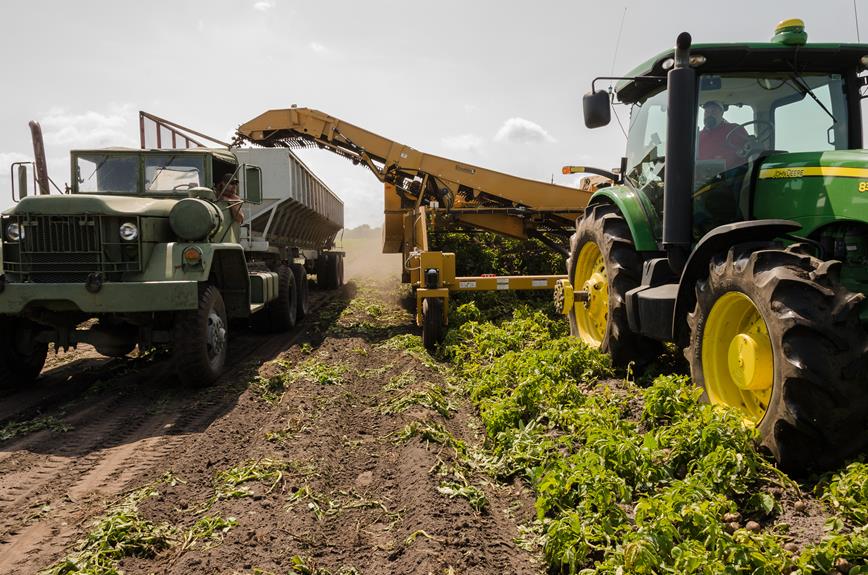Colorado's Deadly Tractor Trailer Menace
This article delivers an in-depth analysis of the ongoing menace of tractor trailer accidents in Colorado. Delving into the state's laws, the disproportionate dangers posed by tractor trailers, and common causes, it provides comprehensive insights. It underlines the importance of understanding legal options and comparative negligence rules post-crash. Additionally, it offers strategies for safe driving and discusses potential measures for reducing such accidents, contributing towards a safer Colorado.

Key Takeaways
- Colorado has specific laws and regulations regarding personal injury and truck accidents, making it crucial to understand these laws if involved in a tractor-trailer accident.
- Tractor trailers are much larger and heavier than other vehicles, making them more dangerous in accidents and resulting in severe injuries and fatalities.
- Truck drivers hold a higher level of responsibility when driving due to their commercial driver's license (CDL), but despite training and regulations, many deadly accidents involving tractor trailers still occur.
- Truck accidents can be caused by various factors such as speeding, reckless driving, improper lane changes, and tailgating, and proving these infractions can strengthen a personal injury lawsuit.
The Prevalence of Tractor Trailer Accidents in Colorado
In recent years, the prevalence of tractor trailer accidents in Colorado has heightened, necessitating a deeper understanding of the state's specific laws and regulations pertaining to such incidents. A closer examination of data reveals a significant prevalence of tractor trailer accidents in rural areas. This can be attributed to factors such as high speed limits, less traffic enforcement, and long, straight roads that can lull drivers into a false sense of security. These accidents not only result in the loss of lives but also have a profound impact on local communities. They can disrupt traffic, damage infrastructure, and cause environmental harm. Additionally, the emotional trauma inflicted on those involved in or witness to these accidents cannot be understated.
Overview of Colorado's Laws and Regulations for Tractor Trailers
As we delve into Colorado's laws and regulations for tractor trailers, it's important to remember that these rules not only govern the operation of these large vehicles but also provide recourse for victims in the event of an accident. The laws are intricate and necessitate the importance of consulting with a personal injury attorney. These professionals are proficient in interpreting the regulations, facilitating the claim process, and holding the responsible parties accountable, which often include trucking companies. The role of trucking companies in accidents is significant as they are required to ensure their drivers are adequately trained, vehicles are properly maintained, and safety regulations are strictly adhered to. The violation of any of these can strengthen a personal injury lawsuit and provide victims with the compensation they deserve.
The Disproportionate Dangers of Tractor Trailers
Nearly all of the 3,978 fatal crashes involving large trucks and buses in the United States in 2014 underscore the disproportionate dangers of tractor trailers, given their massive size and weight compared to other vehicles on the road. This prevalence of tractor trailer accidents is alarming and requires heightened awareness and strategies for safe driving. Their size and weight, coupled with factors such as driver fatigue and mechanical failures, often contribute to the severity of accidents. It is incumbent on drivers to maintain best practices like adhering to speed limits, keeping safe distances, and taking regular rest breaks. Regulatory bodies must enforce stricter compliance with safety standards, while vehicle manufacturers should invest in enhancing safety features. Promoting safe driving strategies is key to mitigating the disproportionate risk posed by tractor trailers.
Common Causes for Tractor Trailer Accidents in Colorado
Regrettably, Colorado has seen a significant number of tractor trailer accidents, often resulting from factors such as speeding, reckless driving, improper lane changes, and tailgating. To mitigate these incidents, effective strategies for truck driver training are crucial. These strategies should focus on enhancing the drivers' risk perception, decision-making abilities, and adherence to traffic rules. The role of technology in preventing tractor trailer accidents cannot be overlooked. Innovative technologies like electronic logging devices to monitor hours of service, collision mitigation systems, and stability control systems can significantly reduce the risk of accidents. In addition, training programs should incorporate simulation-based training to expose drivers to potential hazardous situations, thereby improving their defensive driving skills.
Specific Traffic Violations for Commercial Driver's License Holders
In Colorado, commercial driver's license holders face stringent regulations, and any serious traffic violations, such as speeding or reckless driving, can result in their license being suspended. Strategies for preventing CDL violations include continuous driver education, compliance with rest periods, and regular vehicle inspections. However, if violations occur, the consequences of CDL suspension in Colorado can be severe. This includes not only a loss of income but also potential legal repercussions if the violation resulted in an accident or injury. Additionally, a suspended CDL can lead to increased insurance premiums and difficulty finding employment in the future. Thus, both the economic and personal consequences underscore the importance of adhering to all traffic regulations for CDL holders.
Personal Injury Claims Stemming From Tractor Trailer Accidents
Victims involved in tractor trailer accidents often pursue personal injury claims, seeking compensation for damages such as medical expenses, loss of income, and pain and suffering. The prevalence of tractor trailer accidents in other states underscores the nationwide significance of this issue. These accidents can result in a range of severe injuries, making it crucial for victims to seek immediate medical attention. This not only ensures their health and safety but also serves as critical evidence in establishing the extent of their injuries, which can significantly influence the outcome of their personal injury claim. Similarly, an understanding of the specific circumstances of the accident, including potential violations by the tractor trailer driver, can have a profound impact on the legal proceedings.
The Role of Trucking Companies in Accidents
Why are trucking companies often held accountable for accidents, and what measures are they implementing to ensure safer operations on the road? The role of trucking companies in accident investigations is paramount as they are often held liable in personal injury lawsuits. This stems from their responsibility to ensure their drivers are properly trained, their vehicles are adequately maintained, and that they are following all safety regulations. In case of an accident, the trucking company's conduct is scrutinized, often through the evaluation of logbooks, maintenance records, and driver qualifications. To mitigate liability, companies are implementing measures such as advanced driver training programs, installation of safety technology like automatic braking systems, and stringent hiring practices. However, despite these efforts, accidents still occur, accentuating the complex nature of trucking safety.
Comparative Negligence in Colorado Tractor Trailer Accidents
Colorado's comparative negligence law plays a significant role in determining the compensation amount for victims of tractor trailer accidents within the state. This law calculates the share of fault for each party involved, and the victims' compensation is reduced by their percentage of fault. The role of insurance in tractor trailer accidents is crucial, as it covers the financial liabilities arising from these mishaps. Insurance providers, however, often attempt to minimize their payout by arguing that the victim shared a part of the blame. Hence, the importance of evidence in proving negligence in truck accidents cannot be overstated. Documentation like accident reports, witness statements, and expert testimonies can effectively establish the truck driver's negligence, thereby ensuring just compensation for the victims.
Legal Pathways for Victims of Colorado Tractor Trailer Accidents
In our discussion today, we will explore the legal pathways for victims of tractor trailer accidents in Colorado, and how they can navigate through the complex legal system effectively. An overview of the legal process reveals that the starting point is proving negligence on the part of the truck driver or their company. Colorado's comparative negligence rules may limit the damages, based on victim's level of fault. Damages might include compensation for pain and suffering, medical expenses, and loss of income. The intricacies of these procedures highlight the importance of consulting an attorney, as they can guide victims through the legal process, ensure timely filing within the three-year statute of limitations, and help secure the best possible outcome.
Understanding Damages in Colorado Truck Crashes
To gain a comprehensive understanding of damages in Colorado truck crashes, it is imperative to delve into the state's specific laws, the types of compensation available, and how the comparative negligence rule might influence the final settlement amount. Notably, Colorado's laws hold both truck drivers and their companies liable if they fail to employ strategies for preventing tractor trailer accidents. While the importance of truck driver training and regulations cannot be overemphasized, violations still occur, often resulting in severe damages. Compensation may include medical expenses, pain and suffering, and lost income. However, Colorado's comparative negligence rule may limit the amount recovered, based on the victim's fault level. Understanding these complexities is vital to navigate the intricacies of damages in Colorado's truck accidents.
The Impact of Tractor Trailer Accidents on Colorado Highways
Frequently, tractor trailer accidents on Colorado highways not only lead to significant traffic congestion, but they also cause devastating personal injuries and substantial property damage. The economic impact of tractor trailer accidents in Colorado is substantial, with costs incurred in medical expenses, repairs, lost income, and cleanup efforts. The ripple effects of these accidents extend beyond the immediate parties involved, affecting commerce, tourism, and daily commutes.
Law enforcement plays a crucial role in preventing tractor trailer accidents in Colorado. Strict enforcement of traffic laws, regular inspections, and driver education programs are part of their comprehensive strategy to reduce these incidents. Their efforts not only protect individual lives and property but also contribute to the overall health of Colorado's economy by minimizing disruptions caused by these accidents.
Strategies for Safe Driving Around Tractor Trailers
Despite the challenges associated with driving around large vehicles, adopting strategies for safe driving around tractor trailers can significantly minimize the risk of accidents on Colorado roads. The importance of defensive driving around tractor trailers cannot be overstated, given their size and potential for causing severe accidents. Key strategies for avoiding tractor trailers include maintaining a safe distance, being aware of blind spots, and predicting the trailer's path. Taking extra caution during passing and merging, and avoiding distractions is also vital. Night driving requires enhanced vigilance due to reduced visibility. Ultimately, understanding and respectfully sharing the road with tractor trailers, coupled with defensive driving, serves to enhance safety for all road users in Colorado.
Towards Safer Roads: Reducing Tractor Trailer Accidents in Colorado
Implementing comprehensive safety measures is crucial in the quest towards reducing tractor trailer accidents, a significant road safety challenge in Colorado. Strategies for truck driver training emphasize the importance of proper handling, defensive driving, and awareness of the vehicle's unique characteristics. Regular maintenance and inspections for tractor trailers play an equally vital role, ensuring roadworthiness and identifying potential mechanical issues that could lead to accidents. These inspections cover critical components such as brakes, tires, and lighting systems. A collaborative effort involving truck drivers, fleet operators, and regulatory authorities is essential to ensure adherence to safety protocols. This multi-pronged approach, combining robust driver training and stringent vehicle maintenance, can contribute significantly to safer roads and a reduction in tractor trailer accidents in Colorado.
Frequently Asked Questions
What Kind of Training Do Tractor Trailer Drivers in Colorado Need to Undergo Before They Can Drive?
In Colorado, tractor trailer drivers undergo rigorous training before operating. The training includes mastery of driving techniques, understanding of federal and state transportation regulations, and emphasis on equipment maintenance for safety. Additionally, the health of the driver is pivotal; hence, regular medical examinations are mandatory. This ensures they are physically fit, have good vision, and are free from conditions that could impair their ability to drive safely, such as sleep apnea or uncontrolled diabetes.
How Does the Size and Weight of Tractor Trailers Contribute to the Severity of Accidents?
The size and weight of tractor trailers significantly increase the severity of accidents. Their massive structure leads to greater force upon impact, causing more damage. Additionally, the higher ground clearance can lead to under-ride accidents. Despite trailer design improvements, the inherent risks persist. Speed exacerbates these dangers, as it increases the stopping distance and the force of impact. Thus, the combination of size, weight, and speed can make tractor trailer accidents particularly devastating.
What Steps Can the Colorado Government Take to Improve Road Safety and Reduce Tractor Trailer Accidents?
The Colorado government can enhance road safety and decrease tractor trailer accidents by investing in infrastructure upgrades such as road widening, improving signage, and creating separate lanes for heavy-duty vehicles. Implementing accident prevention technology like electronic stability control systems in all commercial vehicles can also be beneficial. These measures, combined with stricter enforcement of traffic rules and regular vehicle safety checks, can contribute significantly to reducing the incidence of tractor trailer accidents.
What Specific Resources Are Available for Victims of Tractor Trailer Accidents in Colorado to Help Them Recover?
Victims of tractor trailer accidents in Colorado have several resources for recovery. Legal support is available from personal injury attorneys to help navigate the complex legal process and pursue compensation. Insurance coverage plays a significant role in compensating for medical expenses, therapy costs, and lost income. Numerous physical and emotional therapy clinics are also available to aid in recovery. Always consult professionals to understand your rights and options after such an accident.
How Does Colorado's Comparative Negligence Rule Apply to Accidents Involving Multiple Vehicles?
In multi-vehicle accidents in Colorado, the comparative negligence rule applies by apportioning fault to each involved party. The negligence determination considers each driver's actions contributing to the accident. Every party's compensation is then reduced by their percentage of fault, known as comparative fault. If a party is found 50% or more at fault, they are barred from receiving damages. It's a complex process requiring thorough investigation and legal expertise.
Conclusion
In conclusion, tractor trailer accidents pose a significant threat on Colorado's highways. Understanding the state's laws, the inherent dangers of these vehicles, and common causes of accidents is crucial. Victims have numerous legal options, including seeking compensation for damages. However, Colorado's comparative negligence rules can affect lawsuit outcomes. Through safe driving strategies and concerted efforts towards reducing such accidents, it is possible to make Colorado's roads safer.

This post has been generated by AI and was not reviewed by editors. This is Not legal advice. Please consult with an attorney.




